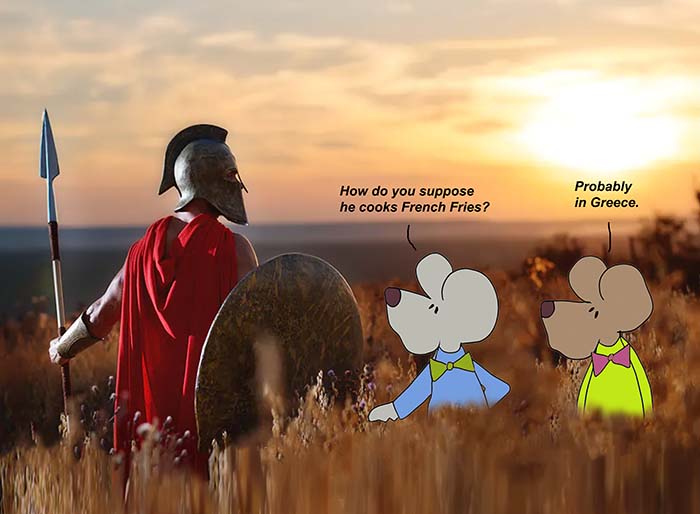I watched football over the weekend. It was more like background noise while I worked around the house. Michigan vs. Michigan State, for example. I didn’t care one way or the other who won, as neither of the teams is my favorites.
However, I was reminded of Michigan State’s mascot. The Spartan. There, dressed in his 7-foot tall costume, was the Grecian-looking warrior, clad with his little fake sword, shield, and skirt. If we reflect historically, Sparta reached the height of its power in 404 B.C. after its victory against Athens. That was during the second Peloponnesian war. I had to look up Peloponnesian. It refers to the island of Pelops, named for the mythical king, Pelops. I like to pronounce it like Bebops because King Pelop might have liked to dance the bebop.
I digress, dang it.
Spartans, Michigan State. Anyway. It struck me odd that this mascot and citizen name also means austere, bare, stark, simple, plain. I wondered how one word could have such different meanings. When I looked up the definition, I found this: “showing the indifference to comfort or luxury traditionally associated with ancient Sparta.”
I see. The ancient Spartans didn’t like comfort or luxury, so now it reflects on my bare office.
Other words do this too. It was on this date, October 31, that the Donner Party, trying to get to California, were unable to cross the Donner Pass. It wasn’t called the Donner Pass at the time. It was called “one helluva dangerous snowy pass.” So they constructed their winter camp on this date. Of course, that decision turned out to be gruesome. There was nothing to eat in that horrible winter on the Sierra Nevada mountain. Some of the group resorted to cannibalism to survive. Yes, they ate the bodies of those who had succumbed to starvation, sickness, and extreme cold.
Again, I always thought it was odd that they were referred to as The Donner Party. There was no party there, I assure you. Of course, we all know that “party” can mean “a social gathering of invited guests” or “a group of people taking part in a particular activity or trip.”
“Kronenberger Party, you’re table for four is ready.” I always think, “Does it look like we are having a party to you? We’re here to eat dinner.”
There are a lot of words like this in the English language, and I wish we would stop it. You would think with 26 letters, there would be endless possibilities for combinations of those letters to form separate words. In fact, the number of possible combinations possible with 26 letters, with no repetition, is 67,108,863.
And. According to the Oxford English Dictionary, there are an estimated 171,146 words currently in use in the English language, not to mention 47,156 obsolete words. So as you can see, we have millions and millions of openings to go. We could call this the “Sorackneem” or “Blatmovic.” Or something.
Another is the word “fair.” This is a perfectly good word for things that are in accordance with the rules or standards — that which is just and equitable.
But fair goes on to mean so many other things. There are fair balls in baseball. Maidens can have a fair face. The weather can be nasty, or it can be fair. And then, of course, we can get a corn dog at the County Fair. Fair enough.
We shouldn’t recycle words. There is not a climate crisis in diction. We have roughly 67 million combinations to work with here.
Another stickler is “lie.” Take a nap? To be in or assume a horizontal or resting position on a supporting surface. Or, tell a fib? An intentionally false statement. One of them is so incredibly wholesome and good. The other is dastardly. How can they be the same word?
Yes, all of this because I watched some football yesterday.
I’m not sure which team was in the lead, but the other team had better get the lead out.
===========
Words have meaning. And their meaning doesn’t change.
— Antonin Scalia
===========
First learn the meaning of what you say, and then speak.
— Epictetus
===========
Everything in this world has a hidden meaning.
— Nikos Kazantzakis
===========
Lies, Lies, and good old King Bebop.
